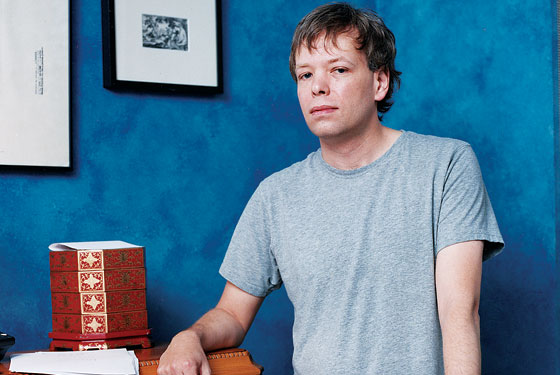 |
(Photo: Stuart O'Sullivan) |
MARTIN HYATT
36, from Covington, Louisiana
Hyatt spent his childhood surrounded by storytellers. His aunts told of seeing Jesus, and his Pentecostal preacher spoke in tongues, while he found himself lost in the lyrics of Merle Haggard. A 2004 graduate of the New School’s creative-writing program, he’s now crafting a new form of southern lyricism with gay characters and plotlines.
In His Teacher’s Words
“He’s a poet in the style of Carson McCullers,” says the New School’s Jackson Taylor. “It’s musical. You know how dogs hear a whistle and their ears perk up? The sound is so good.”
From His Novel, “Grit, My Love”
They say towns like this don’t exist anymore, but I know that they do because I live here. Noxington is one of those towns where the big stores that sell everything and stay open all night have yet to be built. And it doesn’t have those places where people sit at tiny computers drinking complicated coffees and eating strange muffins. It doesn’t have those restaurants where everyone dresses like they spend a lot of money on clothes. There are places like that in towns thirty, forty or fifty miles away, in Mandeville and Slidell and, of course, New Orleans. But here we don’t have that stuff, and sometimes when I can’t sleep or when I’m bored I want those things, that coffee, those computers, those clothes. But I stay here. I stay because Granddad needs me and because in the past when I’ve tried to leave I get sick. I get dizzy, and it’s like I’m going to throw up, pass out or die or something. I am not a good traveler. But one of these days, I’ll leave. I’ll relocate to a place where there are more people and more things. But for now I stay. Those of us in towns like this stay put. Besides it’s the only thing I know how to do well. I am excellent at staying.
But now I am turning thirty in this town where nothing ever happens. It can be said that the fire twenty-five years ago was really something, certainly the biggest event in my life. But if you push something like the fire far enough back, it becomes less your personal history and simply general history. Something you can refer to the way you refer to a history book. People still talk about the fire much more than me, so it is like it is their event, something they have to carry around instead of me.
I am spending the morning of this birthday sitting in the window of the diner where I work. Birthdays are the sort of thing I like to keep a secret. And not only because I am getting old, but because I don’t want anyone to feel sorry for me or to be sad about what I have not become. They blame what I have not achieved much more on the fire than I do. On this thirtieth birthday, I don’t want to think about my classmates whose photographs I always see in the morning papers; heading civic organizations, running for public office. They are doctors now, lawyers. And it seems as if they are all married. I see them smiling with one another in those black and white newspaper photographs. When viewed at just the right time on the right day, the normalcy of marriage seems right. It makes sense to be them.
There are no customers in the place. People get a late start on Sunday mornings. Not even my granddad, the owner, is around. He always goes fishing on Sundays. Jose, the cook, and G., the dishwasher, are out back smoking a number, so I take control of the jukebox and put on some George Strait …
I look around the diner, which caters mostly to construction and road crew workers, hopped-up truck drivers, and to people who work at the courthouse about three miles up the road. And occasionally, to people on the highway looking for a place to get a quick bite to eat as they travel to exotic places where it snows or places that smell green. This world, my world, is muggy, smells like grease and ketchup. It is a world of run down-jukeboxes and shaky folding tables where people grow old in a most expected way.
When your parents are dead, I guess you don’t worry so much about becoming them. Instead, you spend your life wondering who it is you are supposed to be. In a town like Noxington, becoming yourself is never an option.
“Hey Boz, you want some of this?” G. yells from out back.
“No. Go ahead,” I say, knowing that smoking pot will just make me more bored. G. and Jose smoke to make washing dishes and frying eggs less dull. By smoking, they turn the diner into a dream. But I have the natural ability to do this, to see everything as a dream. I also know from that fiery night I spent in the truck that you always wake up from dreams.
I can see them in the kitchen, wrestling with each other like two overgrown kids. They fight with affection, like two lovers in a movie, tussling before a kiss. Sometimes they call each other names, but I know they love each other because I often see them in the kitchen, looking around curiously, making sure the other one is still there.
